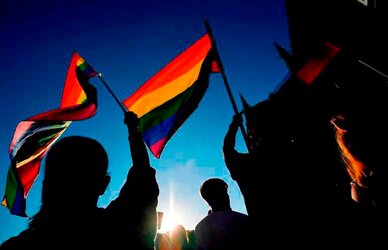[Article]
[Archive]

STRASBOURG: Europe's top court on Tuesday ruled that Romania is violating the rights of same-sex couples by refusing to legally recognise their unions, dealing a further blow to the socially conservative country.
In Romania, an EU member since 2007, homosexuality was decriminalised only in 2001, but the country still bars marriage and civil partnerships for same-sex couples.
In recent years, the Eastern European country has made several attempts to restrict LGBTQ rights, including trying to axe gender identity studies at universities and schools.
The European Court of Human Rights (ECHR) on Tuesday ruled -- by five votes to two -- that Romania is in violation of Article eight of the European Convention on Human Rights, which provides for the right to respect for private and family life.
The judgement by the Strasbourg-based court follows legal complaints brought by 21 same-sex couples before the ECHR in 2019 and 2020, who argued they had been denied certain rights provided for married couples under Romanian law.
'Historic decision'
“This is a historic decision. Romania must recognise and protect same-sex families,“ said Romanian NGO Accept, which supported the initiative launched by a Romanian same-sex couple four years ago.
“Romania must stop the discrimination by law,“ initiators Florin Buhuceanu and Victor Ciobotaru said in a statement, as they vowed to continue their efforts “until equality in front of the law will become a reality in our country”.
While the Romanian government -- represented by an official -- argued that the majority of Romanians disapprove of same-sex unions, the court found that this “cannot be set against the applicants’ interest in having their respective relationships adequately recognised and protected by law”.
In its ruling, the ECHR also stressed that “allowing the recognition of same-sex unions would not undermine the institution of marriage since heterosexual couples can still marry”.
Romania’s influential Orthodox Church has repeatedly spoken out against civil partnerships and in 2018 backed a “family referendum” that would ultimately ban gay unions.
“Civil partnership is the toxic source (as seen in other societies) of the dissolution of the family’s importance and morally formative authority”, it said in a press release.
The judicial arm of the Council of Europe recalled that member states are required to provide a legal framework that allows for the adequate recognition and protection of the relationship between same-sex couples. - AFP
[Archive]

STRASBOURG: Europe's top court on Tuesday ruled that Romania is violating the rights of same-sex couples by refusing to legally recognise their unions, dealing a further blow to the socially conservative country.
In Romania, an EU member since 2007, homosexuality was decriminalised only in 2001, but the country still bars marriage and civil partnerships for same-sex couples.
In recent years, the Eastern European country has made several attempts to restrict LGBTQ rights, including trying to axe gender identity studies at universities and schools.
The European Court of Human Rights (ECHR) on Tuesday ruled -- by five votes to two -- that Romania is in violation of Article eight of the European Convention on Human Rights, which provides for the right to respect for private and family life.
The judgement by the Strasbourg-based court follows legal complaints brought by 21 same-sex couples before the ECHR in 2019 and 2020, who argued they had been denied certain rights provided for married couples under Romanian law.
'Historic decision'
“This is a historic decision. Romania must recognise and protect same-sex families,“ said Romanian NGO Accept, which supported the initiative launched by a Romanian same-sex couple four years ago.
“Romania must stop the discrimination by law,“ initiators Florin Buhuceanu and Victor Ciobotaru said in a statement, as they vowed to continue their efforts “until equality in front of the law will become a reality in our country”.
While the Romanian government -- represented by an official -- argued that the majority of Romanians disapprove of same-sex unions, the court found that this “cannot be set against the applicants’ interest in having their respective relationships adequately recognised and protected by law”.
In its ruling, the ECHR also stressed that “allowing the recognition of same-sex unions would not undermine the institution of marriage since heterosexual couples can still marry”.
Romania’s influential Orthodox Church has repeatedly spoken out against civil partnerships and in 2018 backed a “family referendum” that would ultimately ban gay unions.
“Civil partnership is the toxic source (as seen in other societies) of the dissolution of the family’s importance and morally formative authority”, it said in a press release.
The judicial arm of the Council of Europe recalled that member states are required to provide a legal framework that allows for the adequate recognition and protection of the relationship between same-sex couples. - AFP




